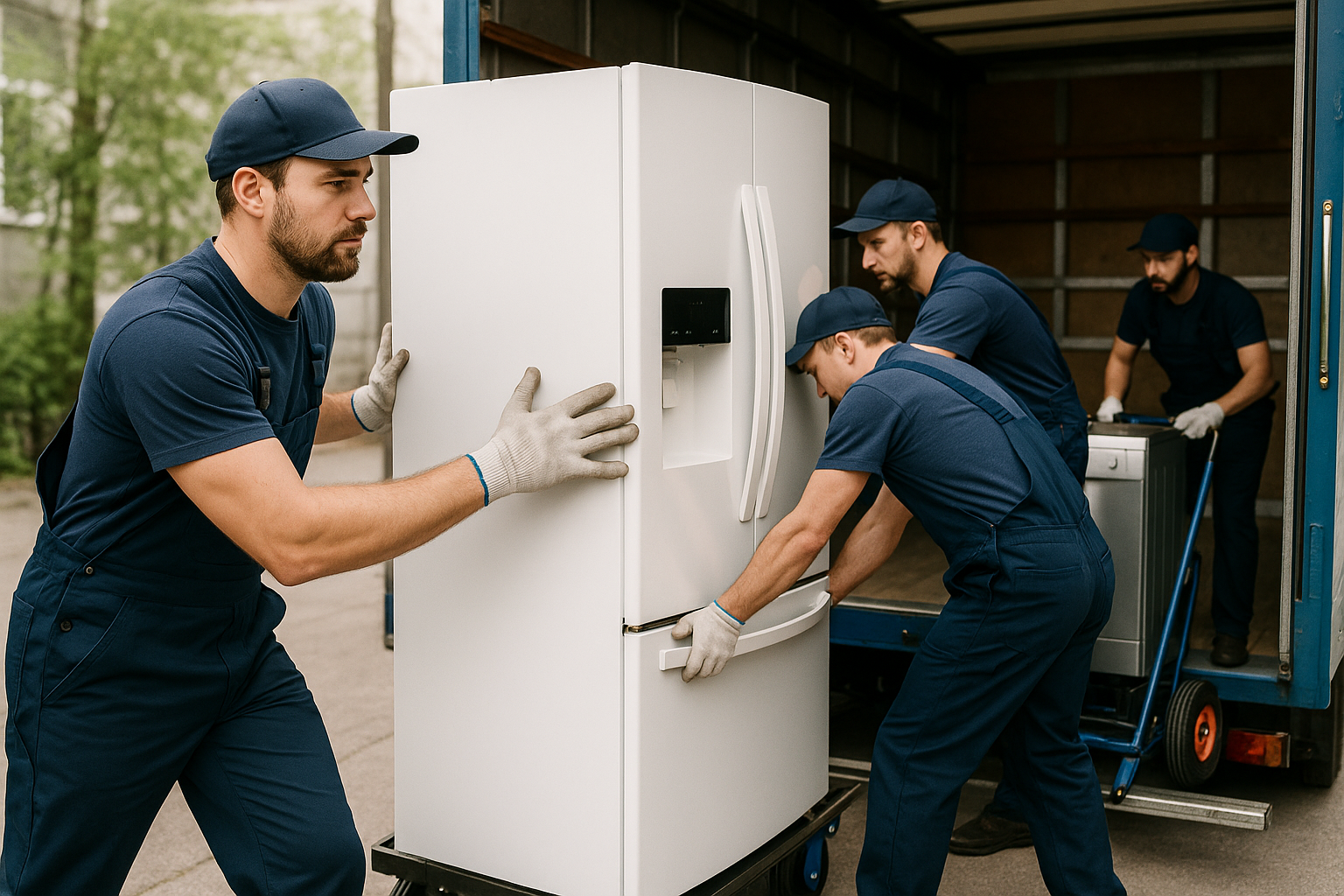Moving to a new home or office is a significant life event, but it can also be one of the most stressful experiences. Among the many challenges that come with a move, transporting large and heavy appliances is particularly notable. Items like refrigerators, washing machines, and commercial kitchen equipment require special care and attention to ensure they are moved safely without causing damage to the appliances or your property. Professional appliance movers can make this process far less stressful. Here’s how hiring the right experts can help simplify your move.
Why Professional Appliance Movers Are Crucial for Your Move
Moving appliances is not a task to be taken lightly. Unlike smaller items, large appliances can be challenging to maneuver and carry, particularly through tight spaces. Attempting to move them without the right equipment and techniques could result in injury or damage to the appliances. Professional appliance movers are trained to handle these items safely, ensuring that your valuable appliances are securely transported to their new location.
Key Benefits of Hiring Appliance Movers
Here are some of the main benefits of hiring professional appliance movers for your relocation:
- Safety: The risk of injury is significant when moving heavy appliances. Professional movers use proper lifting techniques and the right equipment to protect both themselves and your appliances.
- Specialized Equipment: Professional movers come equipped with specialized tools such as dollies, ramps, and moving blankets to ensure the safe and secure transport of large items.
- Time Savings: Moving heavy appliances is time-consuming. Professionals have the experience and tools to complete the job efficiently, allowing you to focus on other aspects of your move.
- Damage Protection: Professional movers take the necessary precautions to prevent scratches, dents, or any other damage to your appliances and property during transport.
- Insurance: Many appliance moving companies offer insurance, so you have peace of mind knowing your valuable appliances are covered in case of any mishaps during the move.
Types of Appliances Moved by Professionals

Appliance movers specialize in a wide range of appliances, both residential and commercial. Some everyday items that can help you move include:
- Large Household Appliances: Refrigerators, washing machines, dryers, stoves, and dishwashers.
- Small Kitchen Appliances: Microwaves, ovens, coffee makers, and other kitchen gadgets.
- Commercial Appliances: Restaurant equipment like industrial ovens, refrigerators, freezers, and dishwashers.
The Importance of Local Appliance Movers
When you’re searching for appliance movers near me, it’s essential to choose a local moving company. Local movers offer several advantages:
- Faster Response Times: Local movers can often schedule your move sooner and arrive promptly, reducing the overall time it takes to move your appliances.
- Familiarity with the Area: Local movers are familiar with the roads, neighborhoods, and specific challenges in your area, which can help them navigate your move more efficiently.
- Personalized Service: Hiring a local company often means receiving more personalized attention and better customer service, making sure all your specific needs are met.
How to Choose the Best Appliance Movers
When selecting appliance movers, it’s essential to make an informed decision. Consider the following factors:
- Experience and Specialization: Look for movers who have specific experience in appliance relocation. These movers will have the tools and expertise needed to handle your appliances properly.
- Reputation: Choose a moving company with a good reputation. Read reviews or ask for recommendations to ensure that the company is reliable and trustworthy.
- Insurance: Always confirm that the movers offer insurance coverage to protect your appliances during the move. This will provide peace of mind that you’re covered if anything goes wrong.
- Cost: Get quotes from multiple movers and compare their rates and services. It’s essential to find a balance between cost and quality of service.
Questions to Ask Appliance Movers
- Do you have experience moving large household or commercial appliances?
- What kind of insurance do you offer?
- What equipment do you use to move appliances safely?
- Can you provide references or reviews from previous clients?
- How long will it take to move my appliances?
How Appliance Movers Make Your Move Easier
Hiring professional appliance movers can make the moving process significantly easier. Here’s how:
- Safe Lifting and Handling: Appliance movers are skilled in safely lifting and maneuvering heavy items, even in tight spaces, to prevent injury and damage.
- Efficient and Quick: Professional movers have the experience and tools to complete the job much faster than DIY methods, freeing up your time for other tasks.
- Proper Protection: Movers use protective equipment like blankets and straps to secure appliances during transport, ensuring they arrive at their destination without a scratch.
- Peace of Mind: With experts handling the heavy lifting, you don’t have to worry about damaging your property or injuring yourself during the move.
Tips for a Smooth Appliance Move
To ensure a smooth appliance move, follow these helpful tips:
- Disconnect Appliances Beforehand: Make sure to unplug and disconnect all appliances ahead of time, especially refrigerators and washing machines. Defrost refrigerators and freezers to avoid leaks.
- Clear the Path: Ensure that hallways, doorways, and staircases are clear of obstacles so movers can easily navigate with your appliances.
- Measure Your Space: Double-check that your appliances will fit through doorways and into their designated spots at the new location to avoid surprises.
Frequently Asked Questions
1. How much do appliance movers cost?
The cost depends on several factors, including the number of appliances, the distance, and the complexity of the move. It’s best to get multiple quotes to compare prices.
2. Can appliance movers handle both large and small appliances?
Yes, professional movers are equipped to handle both large items, such as refrigerators and washers, as well as smaller appliances like dishwashers and microwaves.
3. Are appliance movers insured?
Most appliance moving companies offer insurance coverage, but you should always confirm the details before hiring a mover.
4. Do I need to prepare my appliances before the movers arrive?
Yes, it’s important to unplug and disconnect appliances before the movers arrive. For refrigerators, defrost them to prevent water damage during the move.
5. How early should I book appliance movers?
It’s recommended to book movers at least 2-3 weeks in advance, especially during peak moving seasons.

Hiring professional appliance movers is an investment that can save you time, money, and stress. With their specialized equipment, experience, and insurance coverage, they ensure your appliances are moved safely and securely. Whether you’re relocating a single appliance or moving commercial kitchen equipment, professional movers make the entire process easier. Trusting the right experts to handle the heavy lifting allows you to focus on other aspects of your move, knowing your appliances are in good hands.
Buzzmoving simplifies your move by connecting you with trusted movers nationwide. Request a free quote today and let our experts handle all the details!









